It’s unnerving to hear clunking sounds while you are driving. You don’t know if a serious problem causes it. Thankfully, the probable reasons have already been identified. In this article, I’ll discuss the causes of clunking noise when driving – accelerating, slow, straight, or over bumps.
If you hear the clunking noise when driving over bumps, your suspension may be experiencing some issues. Or maybe some part of the exhaust system is loose. But when you hear this noise when turning corners, it could be a steering issue, bad wheel bearings, or bad wheels and tires.
You may be wondering if it is still safe to drive while this clunking noise is going on. It might not be safe if the sound was caused by a malfunctioning or bad shock absorber or a faulty steering system. You will be causing more serious damage to your car if you do.
Read on to learn more about the clunking noise you hear while driving your car and their probable causes so you will know what to do.
Clunking Noise When Driving
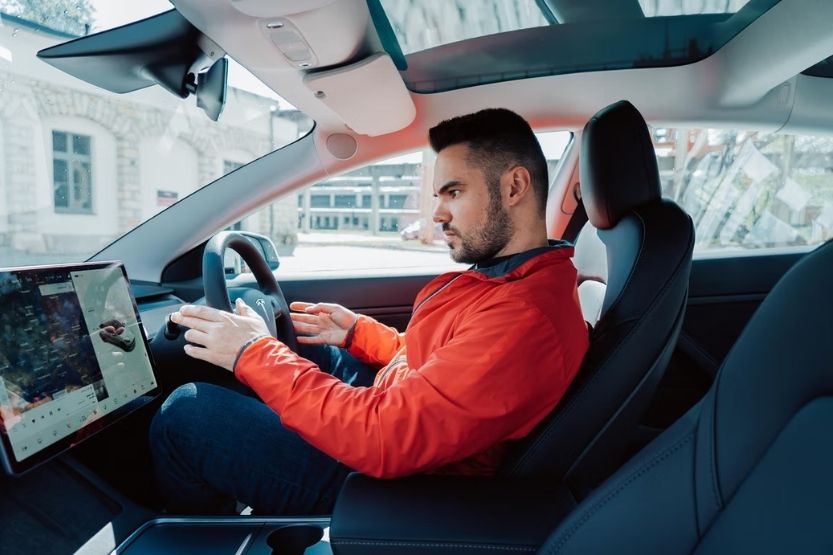
Suspension or Exhaust Issues
If you hear a clunking noise when driving over bumps, your car may have an issue with its suspension or some loose part of the exhaust. But if you hear this sound when you are cornering, it could be a steering issue, a worn-out wheel bearing, or problems with the wheels and tires.
Not Safe to Drive If the Car Has a Faulty Steering or a Bad Shock Absorber
Maybe you wonder if it is still safe to drive while the clunks go on. If the noise was caused by faulty steering or a bad shock absorber, it might not be safe for you to continue driving. You may cause even more serious damage to your vehicle.
Aside from these reasons, there are many other possible causes for your car to produce clunking noise while driving. If the problem is serious, you can even hear this clunking noise when driving slow.
Identify the Cause to Fix the Problem
These are the things that I will discuss with you in detail in this article. Identifying the causes of this clunking sound is important because it will enable you to fix the problem before it gets more serious. So, what are the possible causes of this clunking noise when driving?
Causes of Clunking Noise When Driving
1. Bad Suspension or Shock Absorbers
Clunking Noise When Driving Over Speed Bumps or Potholes
If the clunking noise shows up when you are driving over speed bumps or potholes, your car may have an issue with its suspension or shock absorbers. You shouldn’t continue driving your car until this issue is fixed.
If you continue driving, you can cause more serious damage to your car. You will considerably reduce your car’s breaking time or cause uneven tire wear.
Symptoms of a Faulty Shock Absorber
If the shocks are worn out, your car will be nose-diving while you step on the brakes. Your steering wheel may also vibrate or notice some brake fluid leaking.
Symptoms of a Worn-out Suspension System
Over time, the components of your suspension system wear out, and the clearances between them will be significant. If the clearances in your suspension are already excessive, you may also hear a clunking noise when driving over bumps.
Bring the Car to a Qualified Mechanic
You can avoid this problem by driving only on smooth roads. Do it slowly if you are forced to drive on bumpy roads or potholes. Bu the best fix that you can do is to bring your car to a qualified mechanic so they can assess its problems and perform the required repairs.
2. Malfunctioning Ball Joints
Connect the Car’s Wheel Hubs to the Other Parts of the Suspension
Ball joints connect the wheel hubs of your car to the other parts of the suspension. There may be one or two ball joints in a vehicle, depending on its type. The ball joint/s may or may not be load-bearing.
Difficulty Steering in a Straight Line
You will notice if a ball joint is beginning to fail when it is becoming more difficult for you to steer your car in a straight line. You may hear a clunking noise when driving straight. The noise will be coming from the front wheels.
Louder Noise Means More Serious Problem
Over time and as the problem gets more serious, the noise will be more frequent and will become louder. You will also notice that your steering will be affected. It will cause your steering wheel to vibrate.
Effect of Broken Ball Joint’s Housing
When the housing of the ball joint comes off, sand and grime will get into the joint. This will create clunking sounds while you are driving. If there’s a dent in the joint, the ball will also go in and out of the housing. These movements also cause clunking noise as you drive.
3. Brake Issues
If you hear a clunking noise when you step on the brakes, it could be a problem with a seized brake caliper, an exceptionally loose wheel bearing, or worn-out steering components. All these car components are essential in the efficient functioning of your car.
But when it comes to safety, the most important key element of your car is its brakes. So, if you hear clunking sounds when you hit the brakes, get your car immediately to the nearest car repair shop to have it serviced.
4. Bad Tie Rods
Symptom of a Bad Tie Rod
More often than not, you will hear a clunking noise when accelerating. But you can also hear this sound when you turn at low speeds. If you are experiencing this, you may have a problem with your tie rods.
They can become loose over time. They will rattle around at the links and the joints when they do. This causes the clunking noise that you are hearing.
Connect the Steering Rack to the Steering Arm
The tie rods connect the steering rack to the steering arm. So, when you turn the steering wheel in one direction, the tires will dutifully follow that direction. However, if the tie rod end is loose or is already worn out, the clunking noise will be produced while you are turning the steering wheel.
Noise from the Car’s Front End
The clunking noise will come from the front end of your car, especially when you are turning at low speeds. You will also hear this sound when the boot that protects the tie rod joint is damaged or is already worn out.
Accumulation of Dirt
Perhaps the inner part of the boot accumulates dirt and debris. These foreign matters will cause the degradation of the boot and may also cause grinding sounds as you turn the steering wheel.
5. Worn-out or Damaged Shock Absorbers
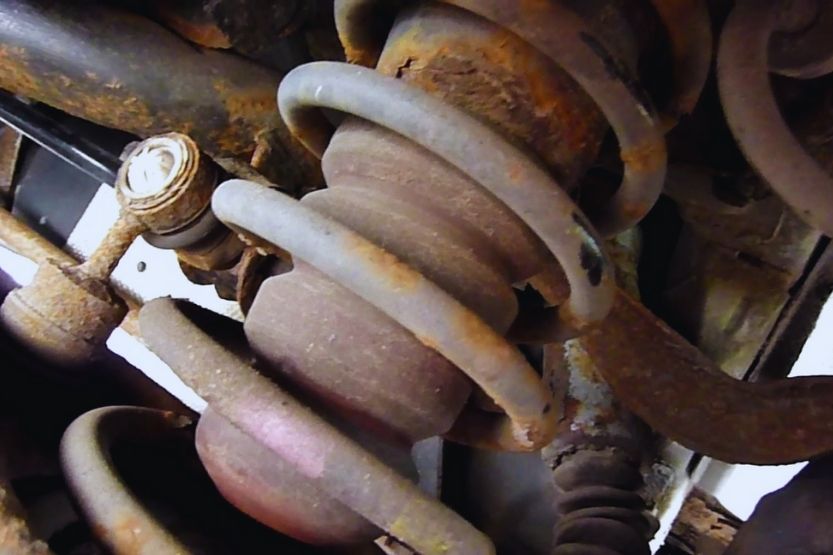
Dampen the Impulses from the Wheels
Shock absorbers dampen the impulses from the wheels. They absorb the impact forced upon the wheels as they run over the pavement. So, they make driving in rough terrain more bearable.
Prone to Damage and Breakage Due to Impact
However, due to the impact, they are subjected to all the time, they are very prone to damage and breakage. As they begin to break, you will hear all sorts of sounds coming from the underside of your vehicle.
Some strange sounds can be tapping noises, while others can be clunking noises. These noises will be very noticeable, especially when the bushings are already cracked. Your car, without your input, may also veer to the left or the right.
Again, what is that clunking noise when I drive? A clunking noise when you’re driving might be due to misaligned, under or overinflated tires, or damaged wheel bearings.
6. Bad or Worn Out Struts
The struts are the ones that give structural support for the suspension of your car. They are also responsible for enhancing the handling and comfort of your car. They also affect the performance of your steering, braking, wheel alignment, and tires.
When they have issues, or if they are already damaged, they will affect your vehicle’s handling and comfort. And you will also hear strange clunking noise because the shocks will keep popping in and out of their strut tubes. You will also hear this noise when you are turning the steering wheel.
7. Bad Control Arms
Even if you are driving in normal road conditions, your car’s control arms will wear out. It can also get damaged if you drive carelessly on bumpy and irregular pavements. If the control arms are already wearing out, it will cause the wheels to be misaligned.
They will produce clunking noises when you steer the wheels on bumps and humps. This will also damage the body mount and cause the whole cabin of your car to vibrate.
8. Damaged Lower Control Bushing
Lower control bushings are the one that makes sure your tires are always correctly aligned, no matter where you drive and whatever road conditions you are facing.
If they are wearing out or are already damaged, the bushings will touch other metal parts close to them. When that happens, you will hear clunking noises.
9. Bad or Worn Leaf Spring Shackles
Leaf springs effectively mitigate off-road conditions for SUVs, vans, trucks, and trailers. If they are subjected to extreme off-road stress, they may break or bend with force. Most cars also use leaf springs at the rear end of the vehicle as part of their suspension system.
Over time, they can wear out, break, or get damaged. When any of these things happen, you will hear clunking noises. The noise will usually come from the end of one or all of the leaf spring shackles.
10. Loose Heat Shield
Modern cars are fitted with heat shields to protect the many car components located in the under chassis of your car. There are also heat shields on the engine bay to protect car parts from the piercing heat of the sun. It is secured to the under chassis or the car’s hood by several bolts.
If one or several of these bolts become loose from their nuts, they will produce a rattling or clunking noise while you are driving.
11. Bad Wheel Bearings
Wheel bearings support the tires and keep your car solidly on the pavement. Over time they will wear out and even get damaged.
When that happens, the wheels will have problems rotating because some of its metal parts will make contact with the nearest metal parts of the car’s chassis that they come in contact with. This condition will produce knocking and clunking noises when driving.
12. Failed Stabilizer Bar
It uses a stabilizer bar or sway bar to keep your vehicle from rolling over. This is a U-shaped metal bar connected to the front wheels of your car. When turning a corner, the car’s weight will shift to the side as it is turning. Then, its body will roll to that side.
So, if the control arm is failing or is already bad because of age or if it was damaged, you will hear this clunking noise each time you turn a corner or go over a bump.
13. Bad Axles
The axle of a car is a metal shaft or rod that connects and rotates the wheels so they will run at the same speed and maintain their positions concerning each other.
If the front axle is damaged or has already worn out, it will be challenging to turn your wheels. Each time you do so, you will hear a clunking noise as you drive.
14. Bad Tires
Your tires can also produce clunking noises. When they are not aligned or if one of them is under or overinflated, it will unbalance your car. This can damage your belt. If that happens, you will hear the clunking noise.
15. Loose Lug Nuts
If the lug nuts on your wheels are loose, it will also create clunking noise when you drive. This is common in cars because their owners forgot to check their tightness for quite a while. If they are loose, they will rattle around their casings.
That’s the clunking noise that you will hear. The simple solution is always to check the tightness of these lug nuts before you drive.
How to Stop Clunking Noise
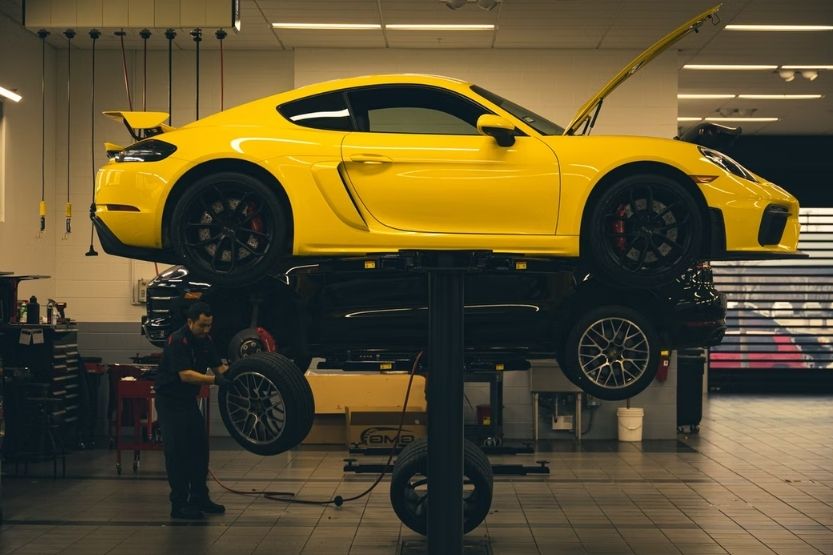
1. Identify the Cause of the Noise
You can easily stop the clunking noise if you know what is causing it. If it’s as simple as loose lug nuts, you can fix the problem yourself by tightening them.
2. Get a Qualified Mechanic to Fix the Car
But if the problem was caused by worn out or damaged steering, suspension, ball joint, brake components, or the other things that I have enumerated in this article, you need a qualified mechanic to fix it.
Fixing these issues is better left to the professionals unless you are a professional mechanic. Professional mechanics have the knowledge, skills, and the right tools and equipment to remove the clunking noise no matter what is causing it.
3. Limit Driving on Smooth Roads
If you are driving and suddenly hear this clunking noise, you can limit your driving on smooth roads until you get to a car service shop where you can get inspected and repaired.
4. Drive the Car as Far as You Need To
When this clunking noise suddenly shows up while driving, you don’t know how far your car can go before any serious problem develops. So, be very careful. Just drive your car as far as you need to.
4 Ways to Stop Your Car from Beeping
Frequently Asked Questions
To help you remember some of the important points that I have given you in this article, I have listed the answers to the often asked questions about clunking noise when driving:
What Causes the Clunking Noise in My Car When I’m Driving?
There are many reasons you hear clunking noise from your car while driving. If you hear this noise when you drive over bumps, your car might have a problem with its suspension, or perhaps a part of its exhaust system is loose.
But if your car produces the clunking noise when you are cornering, you may have steering issues, your wheel bearings are wearing out, or there are issues on your wheels and tires.
Is It Safe to Drive While This Clunking Noise Is Going on?
It depends on what is causing the clunking noise. If it shows up whenever you are driving over humps and bumps on the road, it may be caused by suspension or shock absorber issues. If that’s the case, it’s not safe to continue driving.
You should drive your car to the nearest car repair shop so the mechanics there will be able to inspect your vehicle and see what’s wrong with it.
What Are the Other Most Common Causes of This Clunking Noise When Driving?
There are plenty of causes of clunking noise when driving. Some of the most common causes are:
- Bad shock absorbers or bad suspension
- Failing ball joints
- Bad control arms
- Bad tie rods
- Brake issues
- Damaged lower control bushings
- Loose lug nuts
- Worn out or bad struts
- Bad leaf spring shackles
In Closing: Causes of Clunking Noise While Driving
When the clunking noise shows up while driving over bumps, it may be some issues with your suspension. Or probably some parts of your exhaust pipe are loose.
But if you hear this strange sound while turning corners, it could be an issue with your steering, bad wheels, tires, or probably bad wheel bearings.
Is it safe to continue driving while hearing this noise? It may not be if the problem is caused by faulty steering or a bad shock absorber. You may cause more severe damage to your car if you continue driving. Your best route is the one that points to a car repair shop.
Read next:
Reasons Why Car Makes Humming Noise Getting Louder With Speed
What Would Cause a Grinding Noise When Turning?

![Car Making a Creaking Noise When Driving Slow [7 Causes] car making a creaking noise when driving slow](https://roadsumo.com/wp-content/uploads/2022/07/car-making-a-creaking-noise-when-driving-slow-150x150.jpeg)
![CV Joint Noise [When Driving Straight or Turning] cv joint noise](https://roadsumo.com/wp-content/uploads/2021/06/cv-joint-noise-150x150.jpg)
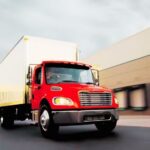

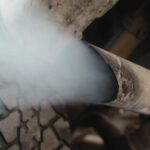
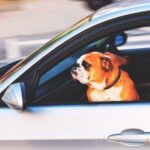
![Read more about the article High Build Primer [When to Use and Best Automotive High Build Primers]](https://roadsumo.com/wp-content/uploads/2021/06/High-Build-primer-300x200.jpg)
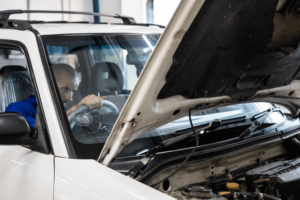
![Read more about the article How Much Do Hydraulics Cost? [Car Hydraulics Price Estimates]](https://roadsumo.com/wp-content/uploads/2021/07/how-much-do-hydraulics-cost-300x200.jpg)